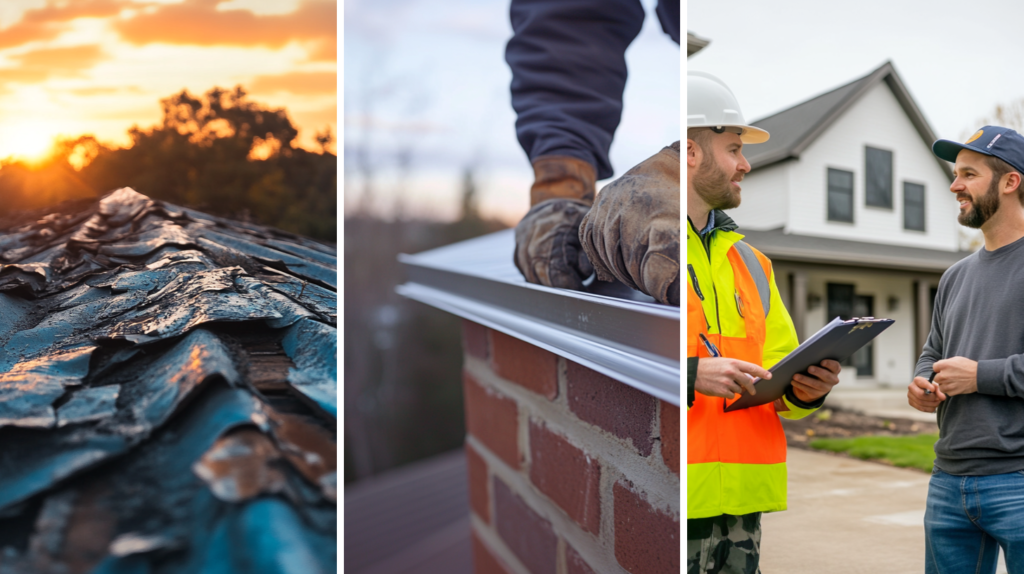Roof Installation Process

Roof Installation Process
Assessment
Measuring the roof is also a crucial step during the assessment phase. This includes determining the roof’s square footage and calculating the number of roof squares needed for material ordering. Roof squares refer to a 10-foot by 10-foot area, so measuring the entire roof’s square footage will allow for an accurate estimate of the materials required.
When planning a roof replacement project, it is critical to account for all these factors to ensure a successful installation. Professional roofing contractors bring expertise and experience, which can be invaluable in managing the complexities of a roof replacement project.
Quote
Several factors can influence the cost of the quote. One such factor is the type of roofing material, such as shingles, as different materials come at various price points. The size and complexity of the roof also play a role, as more extensive and intricate roofs require more labor and materials. Other factors affecting the cost include additional requirements, such as structural repairs, insulation, ventilation, and obtaining necessary permits.
Obtaining an accurate quote for roofing services is essential as it helps homeowners plan their roofing projects effectively and avoid unexpected expenses. By considering factors such as the type of roofing material, the size and complexity of the roof, and any additional requirements or permits, homeowners can ensure that they receive an accurate quote that reflects the actual cost of their roof repair or replacement project.
Understanding the entire process of obtaining a quote helps homeowners communicate more effectively with the roofing company and make informed decisions about their roofing needs. This comprehensive approach ensures that all aspects of the project are considered, leading to a smoother and more efficient renovation experience.
Material Purchase
First and foremost, screws or nails are necessary for securing the roofing materials in place. 1 1/2″ screws or nails are typically used for this purpose. Additionally, 1-1/4″ roofing nails are needed for attaching the asphalt shingles.
Roofing felt paper is another crucial material used as an underlayment. It comes in 15- or 30-pound rolls and acts as a moisture barrier, protecting the roof from leaks and damage.
Asphalt shingles are the primary roofing material and are available in a variety of colors and styles. They are known for their durability and affordability, making them a popular choice for many homeowners. Other common roofing materials include tile roofs, which are durable and come in various styles.
Flashing is essential for ensuring a watertight seal around areas such as chimneys, vents, and skylights. Step and dormer flashing, valley flashing, and drip edge flashing are necessary for effective roof installation.
In addition to these materials, vents, and skylights are optional but can provide valuable ventilation and natural light to the attic space.
Other supplies are also essential to ensure a smooth and efficient installation process. These include clear sealant, large tarps to protect the surrounding areas, self-stick underlayment (an ice barrier), staples to secure materials, and roof sealant for additional protection.
A thorough roof inspection before starting the project can help identify any underlying issues with the roof planes that must be addressed. This step is crucial for a successful roof replacement and ensures all materials are correctly installed.
Purchasing these materials is a crucial step in the roof installation, as they significantly affect the roof’s overall performance and longevity.
Installation
The tools and materials required for the roof installation include a ladder, roofing nails, a hammer, a utility knife, a chalk line, and a nail gun. Additionally, you will need shingles, underlayment, drip edge flashing, roof vents, and asphalt roofing paper.
Next, the step-by-step process for installing the new roofing materials begins with laying down the asphalt roofing paper to provide protection. After that, the underlayment is secured using roofing nails and a nail gun, while drip edge flashing is installed along the roof edges to prevent water damage.
Once these preparations are complete, the shingle installation can begin. It is essential to start at the bottom edges of the roof and work your way up. Each shingle should be accurately aligned and secured with roofing nails.
Pay attention to details like sealing gaps or openings near roof vents and protrusions to ensure the roof is weatherproof and durable. Lastly, perform a thorough roof inspection to ensure everything is correctly installed and meets the desired standards.
Consulting a roofing professional ensures the installation is correct and meets all safety considerations. By following these guidelines, you can provide a successful roof installation process that guarantees the longevity and functionality of your roofing renovation project.
Cleanup
After a roofing project, inspecting the area meticulously for any gaps or loose pieces left behind is crucial. These can pose safety risks, such as tripping hazards or potential damage to the roof. By identifying and promptly addressing such issues, property owners can avoid accidents and maintain the structural integrity of their roofs.
Another vital step in the cleanup process is disposing of excess materials. Properly removing and disposing of the debris minimizes the risk of clutter and damage to the surrounding environment. It also prevents potential blockages in gutters and downspouts, ensuring a properly functioning drainage system.
Reinstalling gutters and drip edges is crucial to protect the newly installed roof. These components help to redirect water away from the roof and prevent water damage to the property’s foundations. Including this step in the cleanup process provides extra moisture protection, extending the roofing system’s lifespan.
Additionally, applying additional layers of underlayment can offer extra protection against moisture infiltration. This step is essential for reinforcing the roof’s defenses, especially in areas prone to heavy rainfall or snow.
Lastly, blowers and magnets are highly effective in removing all debris, including small nails and metal pieces. These tools help maintain a clean workspace and eliminate the potential for injuries or damage caused by overlooked debris.
Expert Guidance through the Roof Installation Process: Sky Roofing Construction & Remodeling
Learn more about the roof installation process and the services we offer:
https://skyroofingconstructiontx.com/roofing-services/
Quality workmanship done right the first time
Contact Us
Address
415 Balcones Heights Rd.
San Antonio, TX 78201
Contact@SkyRoofingConstructiontx.com
Call Us
(210) 942-9797
The post Roof Installation Process appeared first on Roofing Contractor San Antonio - Sky Roofing Construction & Remodeling.
from Roofing Contractor San Antonio – Sky Roofing Construction & Remodeling https://skyroofingconstructiontx.com/roof-installation-process/
via Sky Roofing Construction & Remodeling





No comments:
Post a Comment